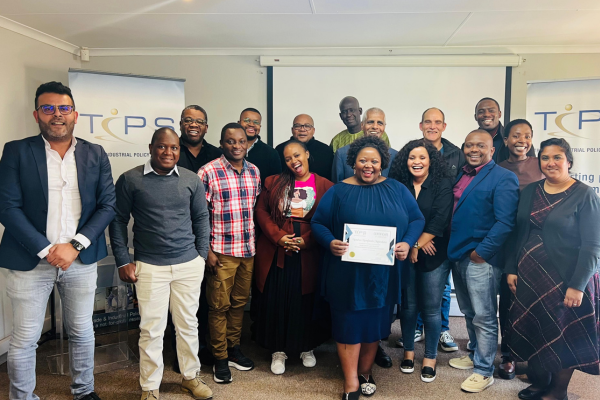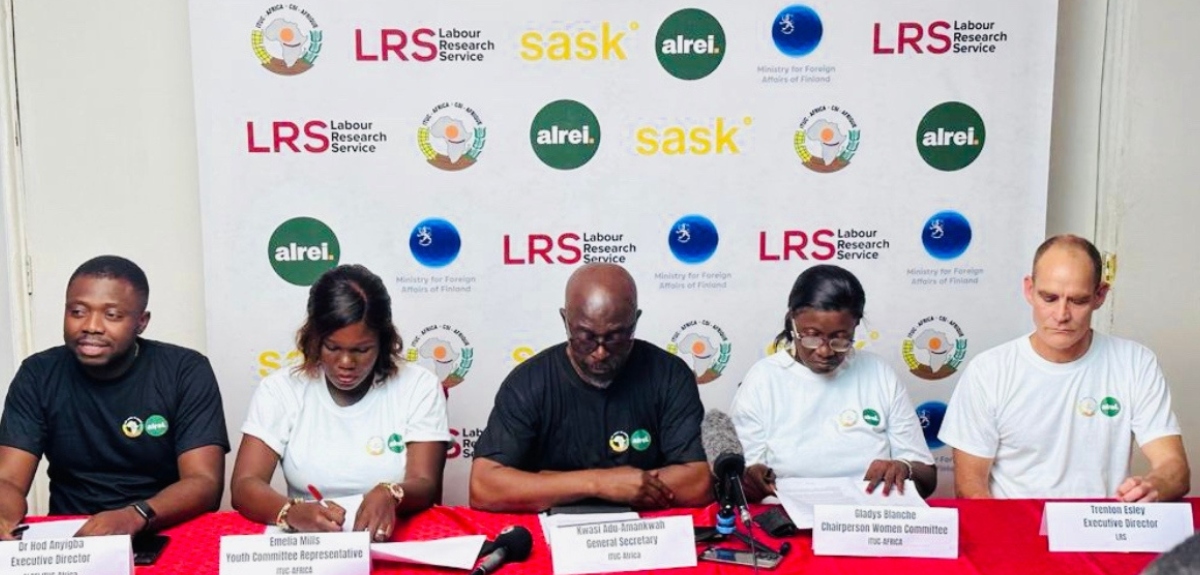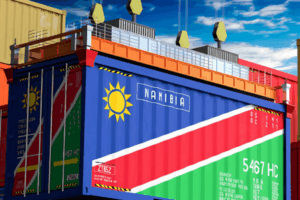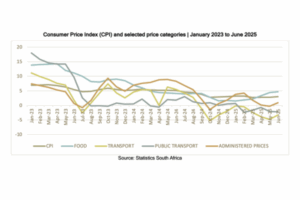The story of our work on the African Continental Free Trade Area (AfCFTA) so far.
“Everything related to job creation, investment opportunities, access to markets, and labour mobility speaks to our daily mandate.” ~ Trade union representative.
Trade unions are engaging in the African Continental Free Trade Area (AfCFTA) to advance decent work in the negotiations and implementation of the Agreement at the national, sub-regional, and regional levels.
LRS and ITUC-Africa collaborate to support participating national centres to advocate for AfCFTA in their respective countries. We provide resources and capacity building to inform trade union policies and strategies for the continental free trade area.
ITUC-Africa affiliates have specific demands to ensure that no worker is left behind as the AfCFTA develops. We build alliances with national centres, academic institutions, civil society groups and, through ITUC-Africa, regional trade union bodies to facilitate continental action on a complex topic. We amplify trade union positions and demands to help build a coordinated voice on the AfCFTA. There is evidence that the trade union movement is raising its profile and influence on this topic and are claiming space in the social dialogue channels that do exist.
Here are extracts from the mid-term assessment relating to influence of trade unions on trade:
"There are a few examples of how trade union confederations have improved their ability to engage and expanded their networks in the trade policy space. Several respondents are now engaging on trade-relevant platforms such as national steering committees, the East African Trade Parliamentarian Summit, and the AGOA forum.”
Extract from mid-term assessment
At the national level, respondents reported that their participation in the AFCFTA project has increased their legitimacy and/or credibility to influence trade and labour-related issues. A trade union representative explains:
“I am observing a desire from governments to want to listen to what we have to say on issues such as labour provisions considered in the (AFCFTA) protocols, particularly the remaining ones that still need to be negotiated”
Trade union partner representative
Some unions are also playing a more active role in the trade policy space: for example, two organisations have been offered seats on national-level steering committees on the AFCFTA. One of them explains what this has meant to them as an organisation:
“We are now one of the first organisations to be consulted on issues related to the AFCFTA and our views are highly regarded. We have also been invited to provide input into a ministerial order on migrant workers. We have been involved from the drafting stage, all the way through to its publication - Trade Union partner representative.
Trade union partner representative
Building capacity for union advocacy on the AfCFTA

Trade union AfCFTA research team in Johannesburg, July 2023
Nine researchers attached to ITUC-Africa national centres in eight African countries have deepened their understanding of trade and the AfCFTA. In 2023, they participated in three short courses on trade. The courses were hosted by Trade and Industrial Policy Strategies (TIPS) in South Africa and facilitated by Professor Faizel Ismael, former lead negotiator and ambassador to the WTO for South Africa.
“I think even the people who are presenting on those topics, they are experts in those areas and it's quite good. Because these are people who do not only have a theoretical perspective of those areas, but also a practical level of experience and that combination does help us to navigate the difficulties.”
Trade union partner representative
The researchers have shared knowledge with their members through various capacity-building activities, enlarging trade competency on the continent.
“The quality of information that has come through this project is excellent. It helps us greatly in the work we do, as it overlaps with our work in trade engagements. We have drawn on this information when we were called in (by stakeholders) to discuss issues on policymaking across various sectors. The information we received (from this project) has given us an in-depth perspective on the AFCFTA and the capability to adequately intervene when needed.”
Trade union partner representative
The researchers contributed insights at workshops and forums, including discussions on informal economy actors and the AfCFTA and lessons from AGOA for union campaigns on the AfCFTA.
VIEW: Trade union research papers and publications on the AfCFTA.

Union AfCFTA researchers present to the Trade union regional capacity building and engagement academy on Informal Economy Actors in Trade – The case of women and youth in the AfCFTA, November 2023, Kenya.
"At the Ghana TUC, we have enhanced our capacity in trade and industrialisation, particularly emphasising the importance of advancing developmental regionalism. Ensuring that our TUC-Ghana members are well-informed and actively engaged in trade discussions is a top priority in our advocacy efforts regarding the AfCFTA. We collaborate for capacity building with others, including the LRS and the National AfCFTA Coordination Office, whose officers often serve as a resource in worker education and AfCFTA awareness initiatives. These efforts also help to build our knowledge of the issues of informal economy operators who undertake the bulk of cross-border trade in West Africa.”
Prince Asafu-Adjaye, Deputy Director of Research and Policy, Trades Union Congress (Ghana)
LRS as the ‘hands, ears and eyes’ of unions at social dialogue mechanisms
The Executive Director of LRS participates in the trade subcommittee of NEDLAC, the statutory social dialogue body in South Africa, offering union insights into the developments and dynamics of the African Continental Free Trade Agreement (AfCFTA) negotiations. South African trade unions have prompted NEDLAC to commission research on a social clause with labour provisions for the AfCFTA. ITUC-Africa affiliates advocating for the decent work agenda under the continental free trade agreement want member states to establish formal social dialogue mechanisms. The LRS supports this advocacy by building trade union competency on trade matters across Africa.
“Two-thirds of negotiations take place at home. If we cannot influence our national government, then we have squandered our main opportunity for influence.”
Unions are engaging in lobbying and advocacy on the AfCFTA
Trade unions are developing trade positions and campaign demands on the AfCFTA. They have increased their influence in the context in which they work. They have a growing resource base on international trade and investment that supports advocacy on the AfCFTA, aiming for effective participation in a democratic and transparent process to ensure workers’ concerns and interests under the continental free trade area.

Nairobi Kenya/November 2023: Media conference after the ITUCAfrica programme on informal economy actors: the case of women and youth and the AfCFTA.
Trade unions have progressed towards building capabilities to effectively engage with and influence the development and implementation of the AfCFTA.
- Mobilisation of workers’ organisations: unions have mobilised, including Ghana (TUC), Nigeria (NLC), Rwanda (CESTRAR), Namibia (TUCNA), Chad (UST), and Kenya (COTU).
- Initiatives at sub-regional levels: SATUCC (Southern African Trade Union Coordination Council) and OSTAC (Central African Trade Union Organisation) have initiated efforts to prepare trade unions for AfCFTA engagement and actively contribute to amplifying the voice of workers in the Agreement’s implementation across their respective regions. OSTAC issued statements advocating for involvement in AfCFTA implementation bodies at ECCAS and CEMAC levels (regional economic communities).
- ITUC-Africa capacity building: ITUC-Africa organised a continental event to build the capacity of African women and youth trade union actors, focusing on understanding trade and investment issues related to industrialisation, employment creation, and sustainable development under the AfCFTA.
- Growing interest and preparedness: There is a noticeable increase in interest and preparedness among national trade centres to participate in AfCFTA-related activities, indicating the expansion of solidarity networks and readiness to engage at national, sub-regional, and regional levels.
“Participation in the project has changed from a point of interest. People are interested in information about trade, in the economic theories around it, and in current news on its practices, opportunities, challenges.”
Trade Union partner representative
“We are currently collaborating with trade union partners in Tunisa and Kenya, where we share information with one another. We are looking at pilot countries where the AFCFTA is being implemented, and sharing best practices and lessons learned with them.”
Trade Union partner representative.
A Labour of Love podcast
An LRS podcast exploring the world of work for civil society and trade union actors in Africa.
RELATED ARTICLES









